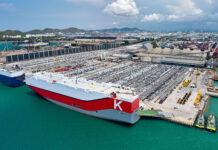
There has been a sequential decrease in the level of Indian containerised shipments converted into direct loadings by container lines on the back of liberalised cabotage rules, implemented in May 2018.
According to new data released by Container Shipping Lines Association (CSLA), the regained volumes have seen a declining trend over the past three months despite continued overall throughput growth. In its filing to India’s Ministry of Shipping, CSLA put such freight conversions at 133,130 TEU in January, sliding from 141,063 TEU in December, 155,839 TEU in November and 170,339 TEU in October.
However, on an annualised basis, CSLA claimed that carriers were able to redirect an estimated 1.82 million TEU of containerised shipments to mainline ships calling at Indian gateway ports in 2021, up from 1.32 million TEU the prior year. Of this, laden boxes accounted for 1.59 million TEU in 2021, with empties pegged at some 232,000 TEU, compared with 1.08 million TEU and 246,500 TEU, respectively, in 2020.
A good portion of Indian cargo – especially out of South India – is usually transhipped via foreign hub ports. The cabotage policy change was meant to tighten this trend, which typically adds to the logistics costs and transit times for cargo owners.
CSLA noted that if there had been no cabotage relaxation to facilitate cargo aggregation, Colombo Port (Sri Lanka) would have captured the bulk of such cargo in January, estimated at 41%, followed by Singapore at 22% and Port Kelang at 11%.
Under the modified cabotage law, foreign-flag carriers have greater flexibility for the movement of export-import containers meant for transhipment and empty containers for repositioning between Indian ports. Previously, tonnage registered in India had a virtual monopoly over coastal or intra-India shipping activity.
While the cabotage modification has placed foreign carriers on a more competitive footing, high port charges remain a pain point in the industry when it comes to seeking more direct shipping connections.
“A significant reduction in the port charges at Indian ports, so as to at least match, if not better, those at neighbouring foreign ports, would certainly help in attracting more traffic at Indian ports and thus help the Indian trade,” CSLA noted in a recent statement.
Indian terminals are widely seen to be far more expensive than their international counterparts in terms of vessel-related and container-related charges.
“This (variance) therefore proves as a deterrent for the introduction of additional services and port calls at Indian ports and eventually impacts the competitiveness of the Indian trade. Besides, it also discourages transhipment at Indian ports – something that the country has actually always wanted to encourage,” CSLA added.
As that debate continues, the slowdown in direct loading conversions does not augur well for the government and industry efforts aimed at reducing logistics costs.
Jenny Daniel
India correspondent





